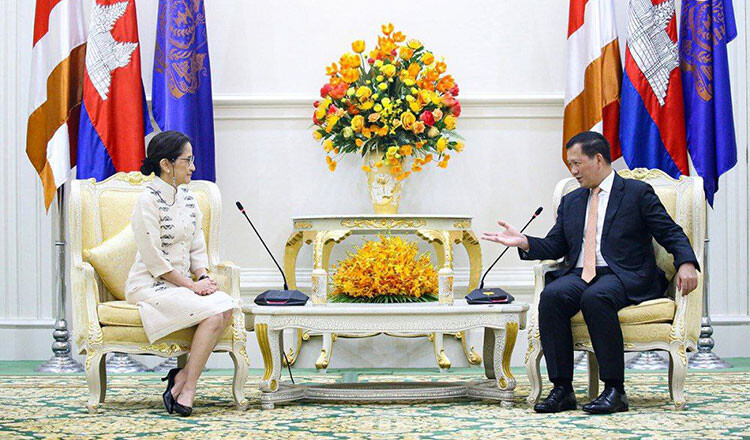
Kuala Lumpur, Malaysia – Cambodia and the Philippines are seeking new opportunities to further solidify and expand cooperation between their two nations. This commitment was expressed by Cambodian Prime Minister Hun Manet and Philippine President Ferdinand R. Marcos Jr. during a bilateral meeting held on May 27, amidst the 46th ASEAN Summit and related summits in Kuala Lumpur, Malaysia.
Strong Relations and Desire for Increased Trade
President Marcos Jr. expressed satisfaction with the strong ties between the two countries and emphasized the Philippines' interest in further strengthening and expanding bilateral trade. In recent years, the Philippines has been actively realizing its economic growth potential within Southeast Asia, making trade expansion with regional countries a crucial task. In particular, Cambodia is recognized by the Philippines as an important export market for certain products like agricultural goods and apparel, as well as a potential investment destination. The Philippines notes Cambodia's emerging economic growth and increasing middle class, anticipating expanded cooperation by leveraging its strengths in the service industry, especially the Business Process Outsourcing (BPO) sector.
In response, Prime Minister Hun Manet highly praised the positive development of Cambodia-Philippines relations and welcomed efforts to explore new opportunities to boost trade and cooperation. Cambodia has also set ASEAN regional integration and economic diversification as important policy goals and plans to accelerate the achievement of these goals through cooperation with the Philippines. Notably, Cambodia has shown significant interest in learning from the Philippines' experience in tourism industry development and healthcare service expertise.
Deepening Cooperation in Strategic Sectors
Both leaders also discussed potential cooperation in several strategic areas, including digital technology and artificial intelligence (AI), Micro, Small, and Medium-sized Enterprises (MSMEs), e-commerce, healthcare services, tourism, and national security and defense.
In digital technology and artificial intelligence (AI), the Philippines boasts one of the fastest-growing digital economies in Southeast Asia, particularly strong in software development and IT services. Cambodia aims to accelerate its digital economic transformation and apply AI technology to various industries, so the Philippines' experience and technology are expected to be of great help. Specifically, cooperation in AI-driven data analytics, smart city solutions, and the establishment of digital government services could be discussed.
Fostering Micro, Small, and Medium-sized Enterprises (MSMEs) is a key driver of economic development for both nations. The Philippines is promoting various policies to support the digital transformation of MSMEs and assist their entry into global markets using e-commerce platforms. As MSMEs account for over 90% of all businesses in Cambodia, benchmarking the Philippines' successful MSME support model could contribute to strengthening the competitiveness of Cambodian MSMEs and creating jobs. Practical cooperation can be achieved through joint MSME exhibitions and technology exchange programs between the two countries.
E-commerce is a rapidly growing sector, especially since the pandemic, and both countries are focusing on its market potential. The Philippines has played a leading role in building an e-commerce ecosystem through major platforms like Shopee and Lazada. Cambodia plans to actively utilize the Philippines' experience in building e-commerce infrastructure and establishing regulatory frameworks. This could also contribute to boosting cross-border e-commerce, leading to increased trade between the two nations.
The healthcare services sector is an area where the Philippines has particular strengths. The Philippines has considerable experience in medical tourism and attracting international patients, and it possesses a large number of skilled medical professionals. Cambodia needs to improve its medical infrastructure and the quality of its healthcare services, and through cooperation with the Philippines, it can explore medical personnel training, hospital operational efficiency, and the sharing of specific disease treatment technologies. This will directly contribute to improving the health of the Cambodian people.
Tourism is a significant source of foreign exchange for both countries. The Philippines is renowned for its beautiful natural landscapes and diverse marine leisure activities, while Cambodia boasts rich historical sites like Angkor Wat. The two countries can increase mutual tourist attraction and create synergistic effects in the tourism industry by developing joint tourism products, expanding direct flight routes, and cooperating on tourism promotion campaigns. In particular, developing themed tourism, including cultural exchanges, will also contribute to enhancing understanding between the people of both nations.
In the areas of national security and defense, cooperation can take place in various domains, including maritime security, border management, and disaster response training. Coordinating common positions and sharing information on regional security issues such as the South China Sea problem can contribute to regional stability. Furthermore, joint response training and technology exchange for cybersecurity threats can also be important cooperation agenda items.
Commitment to Concrete Implementation Plans
Both leaders agreed to instruct their respective ministries and agencies to conduct detailed discussions to translate these priorities into concrete actions. This demonstrates a strong commitment to laying the groundwork for substantial cooperation beyond mere declarative agreements. It is expected that working-level meetings and expert group discussions will lead to the establishment of roadmaps for each sector and the formulation of specific project plans. This cooperation is anticipated to have a positive impact not only on the economic development and regional stability of Cambodia and the Philippines but also on the unity and prosperity of the ASEAN community.
[Copyright (c) Global Economic Times. All Rights Reserved.]






























